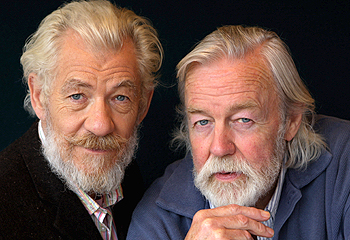| |
“When you're in a play that has had a chequered history,” confides the veteran actor William Gaunt, “you are inevitably nervous about how it will be received.” Gaunt is discussing his latest venture for The Donmar, a revival of T.S. Eliot's verse-classic of 1939, The Family Reunion. “Still,” he adds, with a glint of humour in his eyes, “when the actors and director approach [the play] as truthfully as possible, as we are doing, one can only trust that it will shape up for the best.”

It is certainly refreshing to meet an actor who recognizes the potential pitfalls of producing a play which, as Eliot himself famously and publicly admitted, was one of his theatrical failures. What seems all the more intriguing is the fact that The Family Reunion appears to express views as apposite today as when first staged in those dangerous times just months before the Second World War.
“It ran only a few weeks” when originally staged, not least because it was “ahead of its time” and because, as Gaunt explains, “audiences in '39 were far too used to the realism of dramas by Somerset Maugham or eager for light comedies” to appreciate a play steeped in Christian imagery and employing verse in a classically-inspired way.
“It is stylised to a certain extent,” he adds, “with its use of a Greek Chorus and the presence of Furies which haunt the lead character, Harry,” the part played in this production by Samuel West. Luckily, as Gaunt recognizes, the Donmar audiences are traditionally more open to such stylistic innovation. “They are always prepared to appreciate plays which might be considered ‘difficult',” says Gaunt, obviously grateful that in the twenty-first century, playgoers are ready and willing to engage with a production on an intellectual, as well as an emotional, level.
The Family Reunion is set in the grandeur of a dark and forbidding country house. Its ageing owner has invited her family to return ‘home' to celebrate her birthday. Brothers and sisters are now grown up. Father, a peer of the realm, has long departed. For eight years this widow has looked after the house, awaiting the return of her son, Harry. Harry has himself lost his wife and now carries a weight of guilt on his shoulders. The family, the house, all seem cursed.
Gaunt explains how, beneath the surface of this fascinating play lurks the spirit of Eliot's new-found Anglicanism. An American by birth, Eliot nonetheless embraced this ‘foreign' religion with such passion that it could not fail but influence his work. The Family Reunion is Eliot's consideration of the “decadence of society and how it can be redeemed.”
“There is hope,” Gaunt is keen to add, “a chance to break the curse of this family and for the whole of secular western society.” It seems all the more surprising, however, that despite the time when it was written and the hope it expresses, it makes no mention whatsoever to the troubles of its day. It is as if Eliot was consciously removing his play from contemporary politics. “As part of the wider Bloomsbury set, perhaps he was hoping, like so many of the aristocratic classes, that Hitler and his regime could in some way be accommodated.”
There is no doubt that, as an observation of the British social scene, Eliot's play was potentially subversive in its exploration of ‘class'. “He came to it from an American perspective,” says Gaunt, explaining how such a perspective inevitably manifests itself in a “cross between envy and muted horror. Still, Eliot does not criticize the class system.”
As Charles, uncle of Harry and aristocratic in his own right, Gaunt's character in the play personifies those “feckless aristocrats” that Eliot envies and dislikes in equal measure. Gaunt quotes from his own lines: “A single man can be very cosy in his club, even in an English winter.” The ‘single men' of whom Charles is one obviously belonged to “a circle [Eliot] knew intimately and from observation.” Only an American eye and pen could so brilliantly dissect the social strata of an age and lay bear all its secrets in such dramatic form.
Gaunt is eager to emphasize that The Family Reunion is “a fascinating play with wonderful writing.” It might be in verse, but Eliot “wanted the verse to be accessible -- it is not in iambic pentameter but it has a rhythm of its own which is quite conversational.” For Gaunt, what is important is how “striking” the dialogue can be and how exciting the imagery. “People might fear that it will be heavy going but they'll find it isn't -- there is a lot of comedy in the writing.
Commenting on the “marvellous relationships” and “fascinating characters” which Eliot created all those years ago, Gaunt is obviously enthused by this project. Difficult as Eliot's drama might be to stage, with the fine array of actors brought together for the project there seems little doubt that its message of redemption will capture the imaginations of all who recognize the value and importance of reviving and staging intellectually stimulating and demanding drama, especially drama tainted with a ‘chequered history' both fascinating and intriguing.
© Kevin Quarmby, 2008
Part of the T.S. Eliot Festival, running at The Donmar from 20 November 2008 to 17 January 2009. See The Family Reunion website.
|
|
